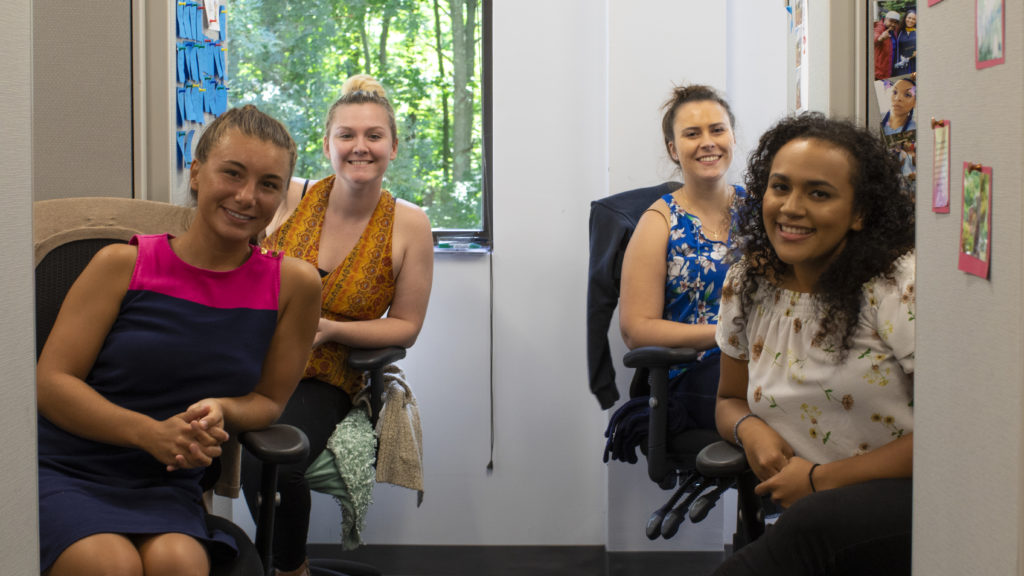More than half the states across the nation have tuition assistance programs for youth in care and those who have recently aged out of the system. To add another layer of support, nearly every state uses federal and state funding to offer extended foster care until the age of 21. Yet, even with these programs and funding in place, only 46 percent of youth in care will earn a high school diploma, with less than three percent receiving a bachelor’s degree.

While states have taken measures to ease the financial barriers that may prevent foster youth from obtaining a post-secondary education, money can only do so much. Often, the difference between this population graduating from college or dropping out is the availability of support.
Most young people pursuing a bachelor’s degree can count their parents offer emotional support and motivation when the pressures of college start to feel overwhelming. Unfortunately, those in foster care don’t have that compassionate person to lean on when times get tough.
In an effort to make bachelor degrees more obtainable for youth in care, national and statewide non-profit organizations, as well as the states themselves, are getting involved to support this population throughout their collegiate career. Since 1981, Foster Care to Success (FC2S) has worked with foster youth heading to college across the nation. Along with providing financial assistance, FC2S offers the 5,000 foster youth in their program career coaching, access to mentors and a 24/7 hotline. Through their comprehensive support system, FC2S has helped over 61% of their students graduate within five years, which is 1% higher than the overall national average.
Every year since 2015, California has passed legislation to provide more support for foster youth transitioning to college. Each bill focused on growing a program called NextUp, which the state hopes will soon cover every county. NextUp provides grants to cover the cost of school supplies, child care assistance and mental health services. In 2017, the program was expanded to provide ten more community college districts with on-campus support programs for youth in care. The latest bill also required every county child welfare agency to have someone in their office that helps foster youth apply for vocational schools, college and financial aid.
Another organization that strives to better the lives of children victimized by abuse and neglect is the Field Center for Children’s Policy, Practice and Research. The Field Center is an interdisciplinary collaboration of the University of Pennsylvania’s Schools of Social Policy and Practice, Law and Medicine and the Children’s Hospital of Philadelphia. Their “Foster Care to College” program aims to make post-secondary education more accessible to foster youth and ensure their academic success continues through graduation. This program recently doubled in size and is now offered at eight colleges in the Delaware Valley. With Foster Care to College still in its pilot phase, the services offered at each location vary, but all offer campus-based support programs dedicated to helping foster youth graduate.
In New Jersey, Foster and Adoptive Family Services (FAFS) and the Department of Children and Families (DCF) have partnered to offer two programs that help youth in care receive a post-secondary education. The New Jersey Foster Care (NJFC) Scholars program, which recently celebrated 15 years of serving foster youth, helps those in the program cover the various costs associated with college such as tuition, books and transportation. FAFS also provides Pathways to Academic and Career Exploration to Success (PACES) coaches for eligible foster youth in six of New Jersey’s 21 counties. To be in the program, the youth must be between 16 and 21 and have a referral from either the Division of Child Protection and Permanency (CP&P) or their caseworker.
For J.G., a foster youth in the PACES program, the experience was life-changing.
“From the moment I got released from jail, I never even thought about going to college,” J.G. said. “My main focus was for me to get back on my feet. I never even could have even imagined me going to college. After a few conflicting conversations with my DCP&P worker, he convinced me to be open about the PACES program. I decided to test the waters and be very cautious about this because I didn’t want to get to fixated on going to college. I can honestly say as of right now I am going to be attending RVCC (Raritan Valley Community College) and I would have never even attempted to go if it wasn’t for my Coach and my caseworker. I want to thank you both for all that you have done for me, you have given me the satisfaction of actually going to college and get my life jumpstarted back up again. I will forever be thankful.”
The PACES coaches provide the type of guidance and support to foster youth that many of their peers receive from family members. PACES coaches assist adolescents through the pivotal decision making process as they transition from high school to the next phase of their lives, whether that entails going to college, a vocational school or entering the work force. Along with helping their students with college, financial aid and job applications, the PACES coaches are someone they can meet with in person when they need that little extra support to keep them heading towards their academic and career goals.
“My experience with the PACES program has been very helpful,” said V. L., another foster youth in the program. “My PACES coach has helped me prepare for college in ways I didn’t think was possible. She has helped me to submit everything on time, explained everything that I wasn’t sure about and taught me to be organized. I am finally set for college and am excited to start thanks to the work of my PACES coach.”
To learn more about national programs helping foster youth in college, click here.
To learn more about FAFS’ PACES coaches, click here.
